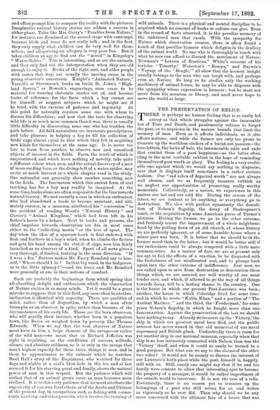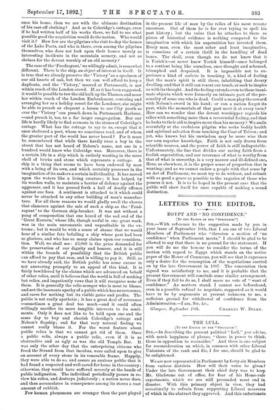THE PRESERVATION OF RELICS.
THERE is perhaps no human feeling that is so easily led astray as that which struggles against the inexorable law of Time and Death, and passionately refuses to forget the past, or to acquiesce in the narrow bounds that limit the memory of man. Even as it affects individuals, so it also affects nations; and while the former are only too prone to treasure up the worthless cinders of a burnt-out passion—the love-letters, the locks of hair, the innumerable odds and ends that remind them of a past happiness—so the latter often cling to the most veritable rubbish in the hope of reminding themselves of past worth or glory. The feeling is a very credit- able one, against which we would say nothing in dispraise,. save that it displays itself sometimes in a rather curious- fashion. Our "sad relics of departed worth" are not always well chosen, and we as frequently treasure rubbish as we neglect our opportunities of preserving really worthy memorials. Collectively, as a nation, we experience in this. matterour hot and our cold fits. During the course of the latter, we are content to let anything or everything go to- destruction. We view with perfect equanimity the demoli- tion of Nelson's flagship, the decay of Shakespeare's tomb, or the acquisition by some American purse of Turner's- pictures. During the former, we go to the other extreme, and furiously resent the improvement of a whole neighbour- hood by the pulling down of an old church, of whose history we are perfectly ignorant, or of some humble house where a minor poet was born. It is better that we should be in the- former mood than in the latter ; but it would be better still if our enthusiasm could be always tempered with a little more- common-sense. As a matter of fact, we are at present only too apt to feel the effects of a reaction, to be disgusted with the foolishness of our misdirected zeal, and to plunge back again into the other extreme of indifference. Just now, we- are called upon to save from destruction or desecration three things which, we are assured, are well worthy of our most tender care, and which, if allowed to go the way of all things towards decay, will be a lasting shame to the country. One is the house in which our present Poet-Laureate was born ;. another, the house in which Coleridge lived for some time, and in which he wrote " Kubla Khan," and a portion of "The Ancient Mariner ; " and the third, the Foudroyant,' for some years Nelson's flagship, in which he fought more than one- famous action. Against the preservation of the last we should have nothing to say. Already we treasure up the Victory,' the ship in which our greatest naval hero died, and the public interest has never waned in that old memorial of our naval supremacy and British pluck. Undoubtedly there is room for yet another ship in our national museum, especially when that ship is no less intimately connected with Nelson than was the 'Victory' itself, and when it could so easily be turned to a good purpose. But what can we say to the claims of the other two relics? It would not be seemly to discuss the interest of our Laureate's birth-place while the poet himself is, happily, still with us. Still, surely one might say that if he and his. family were content to allow that interesting spot to become the property of a stranger, it would be rather impertinent of the outside world to intervene. It is not the case of a relic. Fortunately, there is no reason yet to treasure up the belongings of a poet who still writes for us. and writes as vigorously as he ever did. Then why should we be any more concerned with the ultimate fate of a house that was
once his home, than we are with the ultimate destination of his cast-off clothing? And as to Coleridge's cottage, even if he had written half of his works there, we fail to see what possible good the acquisition would do the nation. Who would visit it ? How few are the pilgrims who visit to-day the homes of the Lake Poets, and who is there, even among the pilgrims themselves, who does not look upon their homes merely as interesting incidents in the mountain scenery, and not as shrines for the devout worship of an old memory ?
The case of the Fondroyant,' we willingly admit, is somewhat different. There is the ship, an object of interest in itself. It is true that we already preserve the Victory 'as a specimen of our old hearts of oak, but then we can well afford to keep a duplicate, and the 'Victory,' moored at Portsmouth, is not within reach of the London crowd. If, as it has been suggested, it would be possible to tow the old hulk up the Thames, and moor her within reach of the London Embankment, restoring and arranging her as a holiday resort for the Londoner, she might be able to preach as eloquent a lesson to our City youth as ever the ' Victory ' can preach down in Portsmouth Harbour, —and preach it, too, to a far larger congregation. But our Weis hardly likely to find sermons in the stones of Coleridge's cottage. What has the cottage to say to us, except that it once sheltered a poet, whom we sometimes read, and of whom the greater part of the world has never heard ? For it must be remembered that while there hardly runs a boy in the street that has not heard of Nelson's name, not one in a hundred would know who Coleridge was. Moreover, there is a certain life in a ship which is entirely wanting in the mere shell of bricks and stone which represents a cottage. A ship is a thing that seems to have been endowed by man with a being of its own, and which certainly possesses in the imagination of its makers a certain individuality. It has moved upon the waters like a living creature ; it has helped, by its wooden walls, to maintain a barrier of defence against the aggressor, and it has poured forth a hail of deadly offence against our foes. A sentiment is attached to it which could never be attached to any other building of man's manufac- ture. For all these reasons we would gladly swell the chorus that clamours against the sale of such a ship as the Fond- royant ' to the German ship-breaker. It was not without a pang of compunction that one heard of the sad end of the Great Eastern,' whose life, though useful in one great work, was in the main unromantic and unprofitable in the ex- treme; but it would be with a sense of shame that we would hear of a similar fate befalling a ship whose past had been so glorious, and who has so many claims upon our considera- tion. Well, we shall see : £5,000 is the price demanded for the preservation of our dignity and honour, and it is still within the bounds of possibility that the British public c an afford to pay that sum, and is willing to pay it. Still, as we have already said, the British public has some excuse in not answering promptly to an appeal of this kind. It is fairly bewildered by the claims which are advanced on behalf of other relics, until it believes that the world is full of nothing but relics, and impatiently vows that it will recognise none of them. It is generally the relic-monger who is most to blame, and not the insensate apathy of a public which has no reverence, and cares for nothing but its visible gains and profits. The public is not really apathetic ; it has a great deal of reverence —sometimes a great deal too much—and it could often willingly sacrifice its more tangible interests to its senti- ments. Only it does not like to be told upon one and the same day to buy and cherish Coleridge's cottage and Nelson's flagship ; and for that very natural feeling we cannot really blame it. For the worst feature about public relics is that we cannot get rid of them. Once a public relic, always a public relic, even if it is as obstructive and as ugly as was the old Temple Bar. It was only the other day that the enterprising citizens who freed the Strand from that incubus, were called upon to give an account of every stone in its venerable frame. Happily, they were able to do so, and assure an anxious public that it had found a respected and well-cared-for home in the country ; otherwise, they would have suffered severely at the hands of public indignation. The individual periodically passes in re- view his relics, and destroys judiciously ; a nation never does, and thus accumulates in consequence among its stores a vast amount of rubbish.
Few human phenomena are stranger than the part played
in the present life of man by the relics of his most remote ancestors. Out of them he is for ever trying to spell his past history ; but the value that he attaches to them as pieces of historical evidence is nothing compared to the imagination with which his superstition has invested them. Every man, even the most sober and least imaginative, is conscious of a certain thrill in the handling of dead bones. The skull, even though we do not know that it is Yorick's—or never knew Yorick himself—once belonged to a sentient being like ourselves, once thought and schemed, triumphed and despaired. It is impossible not to ex- perience a kind of malaise in touching it, a kind of feeling that the man's spirit is still there, inhabiting that dreary dwelling, and that it still can resent our touch, or seek to inspire us with its thought. And the feeling extends even to those inani- mate objects which were formerly an intimate part of the per- sonality of some one who is dead. Could a man play the coward with Nelson's sword in his hand ; or can a nation forget its past, while the memorials of that past meet it at every turn? How can we wonder that the devout worshipper regards his relics with something more than a reverential feeling, and that he looks to their aid to inspire more than his memory ? We smile scornfully at the credulous pilgrim who seeks bodily health and spiritual salvation from touching the Coat of Treves ; and yet, who knows but his unwisdom may be more wise than our own superior knowledge. Faith is not only drawn from scientific sources, and the power of faith is still indisputable. Unfortunately, the line that divides our saving faith from a foolish superstition, and our reverence of what is worthy from that of what is unworthy, is a very narrow and ill-defined one. Here, as elsewhere, it is the proper sense of proportion that is wanting; and as we cannot endow a people with that sense by an Act of Parliament, we must try to do without, and submit with as good a grace as possible to the vagaries of those who possess it not. It is to be hoped in the present case that the public will show itself for once capable of making a sound distinction.



































 Previous page
Previous page